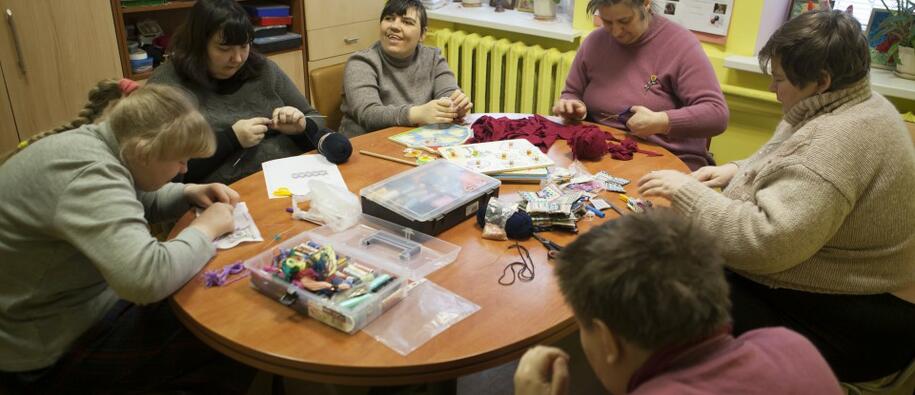Currently available funding
There are currently no calls for proposal.
Programme Summary
Why was the programme needed? The programme was initiated at a time of significant anti-European and anti-human rights trends firmly established in the mainstream politics. General lack of awareness and sensitivity towards marginalized populations as well as communities living in socially and economically deprived regions were evident at all levels of governance. The lack of a genuine commitment to implement rights-based reforms was fostered by deeply embedded social and political attitudes, which regrettably became one of the key obstacles hindering efforts to bridge the gap between legal framework and social reality. Moreover, this sometimes led to insensitive efforts to impose discriminative laws that would have an adverse effect on minorities and marginalized groups, the most obvious example being legislation targeting LGBTI community by denying them freedom of expression and assembly. At the start of the NGO programme the general context of Lithuanian NGO sector could be described by several characteristics like sporadic efforts and occasions for networking with NGO and cooperation with authorities, lack of managerial skills and results-oriented attitude, absence of identity of NGOs and miscommunication of their purpose of existence. Unsurprisingly, an NGO sector of this shape and status could not deliver much to strengthen civil society development, enhance contribution to social justice, democracy or sustainable development. The low capacity of Lithuanian NGOs to advocate for the welfare of their beneficiaries as well as for the viability of the sector itself was well exposed during the process of strategic planning of EU structural investment programmes for the period of 2014-2020. The upcoming EU structural investment programmes were seen as a ray of light and hope for long awaited social reforms as well as a warrant of NGO sustainability and development of civil society in the long run. In 2015, regrettably, strategic consultations and focus groups became rather formal and addressed tactical decisions on programme implementation methods only. In light of the abovementioned developments the launch of EEA Grants 2009-2014 NGO Programme Lithuania was very timely and played a significant role in providing NGOs with the support and tools to sustain their independence and contribute to more active role of civil society in the policy- and decision-making processes. What did the programme achieve? The programme had a high number of outcomes, outputs and indicators to achieve, but the interest of more than 600 applicants and commitment of 56 project promoters have made it possible and to a large extent successful. Key achievements and impact induced by the implemented projects and the operations of the Fund Operator include: • NGOs working with children and families at risk as well as persons with disabilities managed to propel long awaited reforms of institutional care system and force a shift of policy towards greater sensitivity of stakeholders and more inclusiveness within the society. • Methodological and systematic approach brought to numerous social services, in many cases utilizing the experience and good practices of Norwegian and Icelandic societies. This kind of development allowed NGOs being accepted as reliable partners at a number of municipal authorities and institutions, many more willing to do so in the nearest future. • The idea of voluntarism was highlighted at national and regional levels, volunteering opportunities made visible and accessible and NGO skills of volunteer coordination improved. • Consolidated networking efforts, shadow reports, international expertise and operational practices used as advocacy measures at a higher qualitative level thus increasing involvement into policy and decision making. • 16 NGOs learned critical competences of communication, building identity and exposing their mission what will serve to their acceptance and successful advocacy efforts. • An identity and the purpose of existence of the NGOs and the sector itself was highlighted to the society thus strengthening positive attitudes towards activities implemented by NGOs. • Society at large was made more sensitive towards the needs of vulnerable groups, especially those socially excluded and economically deprived. • 10 web-based tools developed and promoted that help improving transparency of NGO sector, fostering civic participation, awareness of human rights and fundamental freedoms, inclusion of vulnerable groups, accessing social services, help and assistance, taking part in activities and events organized by NGOs. • Consultations with beneficiaries and stakeholders enabled a better representation of the needs and interests of vulnerable groups. • Project planning, drafting, budgeting, organization and reporting skills of 53 NGOs significantly increased through trainings conducted by FO and external experts. In addition, risk management and results-based management concepts were presented and provided for immediate application during application and project implementation processes. How were bilateral relations strengthened? Bilateral cooperation with Norwegian and Icelandic partners increased significantly: 1/3 of the projects had at least one donor project partner, while 24 more bilateral initiatives funded by the bilateral fund have complemented the achievements which surpass the numbers of previous round EEA Grants civil society programme and all programmes of 2009-2014 EEA and Norway Grants in Lithuania. The intensity of bilateral cooperation during the programme is confirmed by achieved bilateral outcome indicators: Lithuanian NGOs have entered into 14 partnership agreements with Norwegian or Icelandic counterparts as well as implemented 14 projects with expected shared results. In addition to that, 26 articles were published to highlight the cooperation between the two countries in the areas covered by the programme. What will be the impact of the programme? Wide cooperation opportunities and ample space for creative ideas for social issues allowed NGOs developing and testing various innovations, many of which were related to application of new technologies and unconventional approach. Some of the examples include (1) art diplomacy for human rights advocacy employed, (2) web-based tools informing about the work of municipal, state and court authorities, helping coordinate voluntary work or informing persons with motion disabilities about the wheelchair-friendly doorsteps of institutions and private companies; (3) democratic education as a new form of promotion of citizenship together with conventional secondary schooling; and (4) new methodological approach to social services for family integration, focusing on child rights. These will continue to have an impact beyond the end of the programme. Three pre-defined projects under the programme also aimed at strengthening the entire NGO sector. The first project addressed the problem of sporadic and uncertain NGO funding opportunities by training 17 NGOs the key fundraising skills, individually consulting on development of their fundraising strategies and providing immediate opportunities to test several fundraising actions. The second project tackled weak advocacy skills of NGOs – 16 organizations were trained of various advocacy technics, provided with advocacy tools and methodologies, as well as were individually assisted when developing their advocacy strategies. In addition to that, an advocacy information web-based tool was launched to promote advocacy related information, publications, royalty-free photos, success stories and guidelines for NGOs, grassroots and civil society activists. The third project addressed NGO sector transparency and accountability issues – the sector mapping exercise was performed in order to find out the number of active NGOs (as well as total number of NGOs) and induce them to disclose as much information about themselves as possible at the newly launched web-based interactive database platform. In addition to that a study on existing activities, trends, capacities and key obstacles/opportunities for further development of the Lithuanian NGO sector was developed. The study shall serve as a supporting document for the database and both shall be used to inform potential donors of the size, diversity and level of activity of Lithuanian NGO sector while the study should give an in-depth insight into the environment and setting were NGO operate, face challenges and overcome obstacles.

